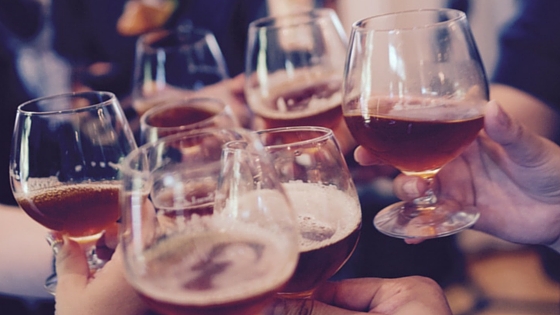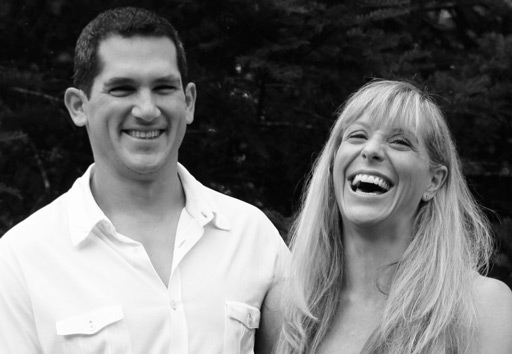
You might think the response to the question, “Is alcohol healthy?”, is not worthy of much more than a quick answer of “no” and a long list of the physical harm it can cause. But if you don’t just look at the physiology, the answer becomes more complex and interesting.
Picture this…
You get home after a hard day. You’ve been dealing with constant stress from the minute you left home to battle rush hour traffic throughout a day of non-stop serial crises at work only to walk in your front door and hear the deafening sounds of your kids fighting over something that sounds like it is the beginning of the next world war.
Maybe you are like the Dalai Llama and can remain tranquil amongst the raining molten lava of an erupting volcano but if you are somewhat human like the rest of us, you clearly feel the need to decompress. One tradition that has spanned cultures, centuries and demographics is to have a drink. While I’m not even close to suggesting alcohol is the only, or best way, to decompress, it is certainly common to use alcohol for unwinding.
Good or not, before I can answer the question, “is alcohol healthy?”, let’s look at what else alcohol is good for… or at least, what people commonly perceive it useful for.
- reducing nervousness…so you can approach someone you are intimidated to talk to.
- increasing courage…so you can dance like no one is watching.
- slowing down your thoughts…so you can take a break from regretting the past or worrying about the future
- creating common ground…so you can celebrate together and share joy
- transcending the mundane…so you can feel like today is special
After reading this, you either want to have a drink, think I’m dependent on alcohol or are disturbed by the idea that alcohol can be such a crutch to achieve things that should, and can be, achieved in other ways.
Let me interject:
Don’t have a drink…at least not yet.
I’m not an alcoholic or reliant on it for the above benefits.
I don’t think that using alcohol in the above ways is ideal or a strategy to put forward with any sort of regularity.
Note: the above benefits are all pretty much psychological in nature.
On the other hand, many medical studies consider alcohol healthy and good for:
- Reducing the risk of cardiovascular disease by 25% to 40% with moderate consumption,
including people with:
- type 2 diabetes
- high blood pressure
- existing cardiovascular disease
- people over the age of 65
2. Raising levels of high-density lipoprotein (HDL, or “good” cholesterol)
3. Better insulin sensitivity and blood clotting factors
WAIT! Don’t start free-pouring yet! All these studies and the benefits come with MODERATE alcohol consumption.
What’s moderate alcohol consumption?
Well, it differs significantly from country to country as well as affecting different individuals differently.
But many guidelines declare 1-2 drinks a day for men and 1 drink a day for women to be moderate.
Regardless, people who are otherwise taking care of themselves, i.e., don’t smoke, exercise, get enough sleep, eat healthy, manage stress in natural and effective ways, don’t really get a significant benefit from even moderate drinking.
Still, these same people aren’t likely to be poorly affected by moderate alcohol consumption either. However, drinking does increase the risk of cancer and this risk grows with each additional drink.
Is alcohol healthy: the bottom line?
- If you are otherwise healthy, you don’t need to drink at all to maintain your health.
- If you do drink, keep it moderate and you will minimize your risks.
- If you are someone that is strongly affected by alcohol, i.e., a little brings you discomfort, headaches, flushed skin, sweats, etc., it’s probably best you avoid it.
- If you struggle with alcoholism or addiction, or it runs in your family, take a pass.
- If you are only a binge drinker, reflect on that and know it is far more harmful to have 7 drinks in a night than a single drink each night for a week.
- Avoid alcohol concoctions that mix with other unhealthy things like pop, sugar dustings, and even fruit juices – not only are you taking in more calories and bombarding your body with immune suppressing/hormone imbalancing infusion, you are also increasing the chances of a nasty hangover and digestive distress.
- Obviously, avoid alcohol if you suffer from any serious health issues or take medications that have adverse effects when combined with drinking.
After all this, you might still be saying “The psychological benefits you listed above makes alcohol healthy”. Well, there’s ways to get these benefits without alcohol.
- To reduce nervousness: catch your thoughts. Push out the negative and self-doubting ones with positive, concrete memories of your worth. Take a series of slow, deep breaths in, hold and then exhale slowly out. Conscious deep breathing can work wonders to calm the nerves, slow your heart rate and relax your muscles and state of mind.
- To increase courage: recognize that rarely are the consequences as dramatic as you think. What’s the worst that can happen? Do you remember another time you took a risk and failed? Was it that bad? Wouldn’t it be worse if you never tried.
- To slow down your thoughts: take up meditation and practice mindfulness so you are aware of the present. Gratitude and awareness have an incredible way of slowing down time. Take a look at the CREATE Your Day Method I provide for free on this website.
- To create common ground: expand your empathy. Ask questions and be genuinely interested in the answers. Learn about the people you are with and engage in activities that increase cooperation, like sports, problem-solving, cooking together, etc.
- To transcend the mundane: try something new and be creative. When you expand your world with new hobbies, skills, and information, you will almost always feel more alive and be buzzing just on that newness that brings back those feelings of childhood awe. Be creative – there is almost nothing more life-affirming than bringing creations into the world.
The naked truth is present in this tweetable:
Celebrate life with things that make you more alive #mindmuscle Click To TweetI know. I know. Sometimes you are going to drink anyways.
Alcohol might never be good for your liver or improve your performance (in most worthwhile feats, anyway). It certainly impacts your sleep quality negatively and impairs your ability to burn fat. But once in a while, it can be fun and life is too short not to throw caution to the wind when the moon is full and the wolves are howling. 😈
So, If you are going to drink, then use the following strategies to come out of your party ready to get back to high performance.
The Guide To Making Alcohol Healthy…uhm…ier
Or…
How To Reduce A Hangover:
Hint: Treat it like the toxin and anti-nutrient it is. While the following strategy doesn’t make alcohol healthy, it makes it less harmful. toxin
(These tools are all things I take personally but I cannot give you medical advice to take them or not. It is up to you to consult a doctor or healthcare practitioner directly for specific and personalized advice on each one of the following.)
B complex – Taking B vitamins before and after drinking aids the body in detoxification. Alcohol also interferes with the absorption of B vitamins, like B-12, which is crucial for healthy cellular function. So, fortifying with a supplement is wise.
NAC – N-Acetyl Cysteine is a precursor to glutathione which is the most powerful anti-oxidant. NAC can save a liver from major damage. It would be wise to take some before and after drinking as well.
Magnesium – Replenish magnesium after drinking since it too is depleted by alcohol. Magnesium can aid in relaxing the muscles which in turn takes the edge of a hangover.
Activated Charcoal – This stuff is like a purification filter in a pill you can use to treat many different types of overdoses and poisonings. It’ll pull the invader right out of your system. I take it even if I suspect I’ve eaten something semi-toxic. Take it before drinking and again in the morning.
Milk Thistle – People underestimate the power of this supplement to protect the liver but there is actually vast research to support its value in protecting and healing the liver. Taking it for consecutive days post drinking may give the greatest benefits.
Curcumin – If you’ve been drinking, you have inflammation. Curcumin found in turmeric is a powerful natural anti-inflammatory that I’ve seen reduce anything from a swollen ankle to lower cortisol after intense exertion.
Omega-3 – Get these from fish oil or other sources to help protect your brain, heart and just about everything else. I take it regularly and if you’re not, surrounding alcohol would be a good time to start.
Vitamin C – Can be taken daily and upped after alcohol to boost liver detoxification. It also is a precursor to glutathione and protects the body from oxidative stress.
Water – Nothing like good quality H20 (isn’t that right, Waterboy?) I really don’t need to say that if you’ve been drinking, you are dehydrated and drinking, ideally clean mineral spring water, before, during and after alcohol will go a long way to helping you out.
This is a fairly long list and can be a bit of overkill but I wanted to provide you with options.
Another strategy is to pick a quality stack (always choose quality supplements or don’t take any). I personally use the following antioxidant immune booster for far more than curing a hangover and it combines a variety of the properties above into one offering.
Help Boost Your Body’s Immune System with ViruTech
A staple supplement for seasonal health.
Now don’t use this list of tools as an excuse to drink with impunity.
“I need a drink”, might be the most widely used phrase in response to feeling stress. But if you are truly interested in reducing stress in mind and body, replenish the body with the nutrients you need to lower cortisol while boosting GABA.

I think life is about balance and enjoyment. You gotta go with the flow sometimes. I feel that if you consciously make the decision to drink vs out of habit, social structure, etc, it’s always better. Same with food. Good-good!
Very true. Being mindful of your actions and motivations supports intentional living. This is the path to a life well-lived.